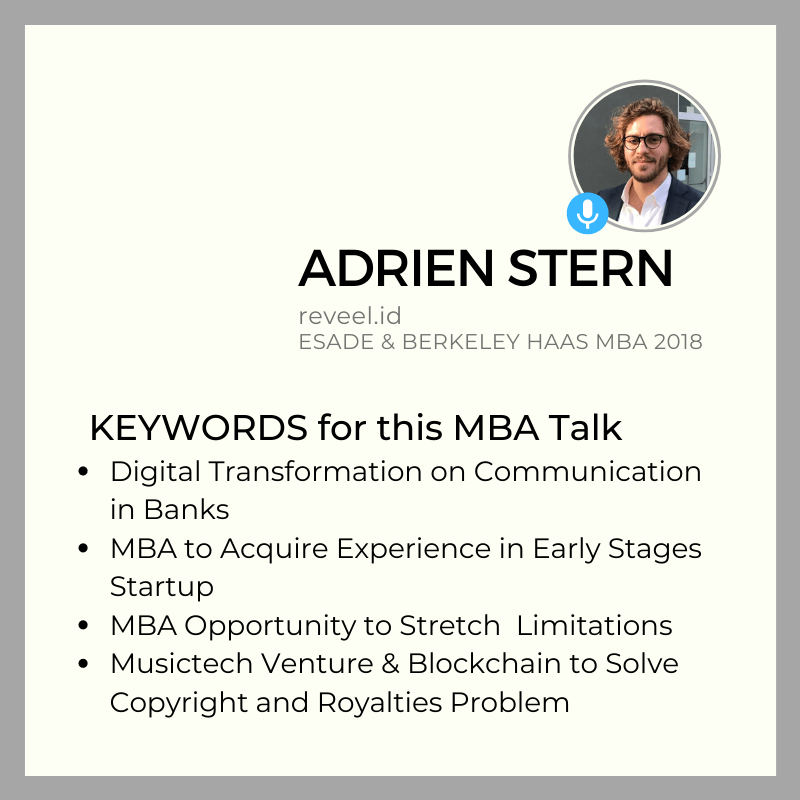Would you consider to make a big change in your career to follow your dream job?
In this episode, we are joined by Adrien Stern, an ESADE graduate from the 2018 class.
Adrien worked in one of the biggest European banks with digital transformation. Now he is CEO of Reveel.id, a music tech venture startup that collects music data by offering a digital passport for creatives.
At the time of this interview, he was leading Mediarite, a music blockchain startup that connected artists directly with digital streamers and download platforms.
In this interview, we will understand how did he manage to be president of an MBA club, have two internships at the same time, be a part of an exchange program in Berkeley Haas, and how he was able to make the change in his career to follow his ambition and heart to work in something that he believes.
- Episode Notes
- Adrien´s Background
- Adrien´s Experience in Bringing Digital Transformation in a Bank
- Managing an MBA Club Presidency & Two Internships
- MBA Exchange Program at UC Berkeley Haas
- Acknowledging Our Limits & Potential
- Building Music Tech Venture Startup
- Applying Blockchain to Solve the Royalties Problem
- Motivations for Entrepreneurs to Do an MBA
You can also listen on iTunes, Google Podcasts, and CastBox, or in any other podcasting app by searching for “MBA Talk”.
If you enjoyed this episode be sure to join our mailing list to find out about what books are coming up, giveaways we’re running, special events, and more.
Check out our courses specifically designed for MBAs
Learn how to manage a backlog, workload, hand off activities to a team, differences managing company employees vs contractors and much more!
Coming Soon –> Connect if you want to know more!
Design thinking is all about creating unique solutions to complex problems — no matter how big or small.
Coming Soon –> Connect if you want to know more!
- 2-days long
- Instructor-led
- Management focused
- Methodology to attain goals and solve problems
- Use of real case studies
- Green Belt certification included
Live a day working with the Sprint methodology created at Google Ventures to solve big problems and test new ideas in just 5 days.
Coming Soon –> Connect if you want to know more!
Episode Notes
Adrien´s Background
Where are you based and who are you?
[00:27] I’m currently in the Bay area in Berkeley, very close to Haas. In the offices of Skydeck which is the Berkeley accelerator because Mediarite (now Reveel.id), my startup, has been accepted as one of the teams for the spring batch. I’m normally based in New York, but I try to share my time between New York and the Bay area.
So my name is Adrien Stern, I am Swiss in American. I grew up in Switzerland, but then when I was 25 years I left for the US and since then I’ve traveled a bit. I lived in Spain, in Germany, on the West Coast, and on the East coast of the US, but now based in New York.
What’s a good resource for entrepreneurs?
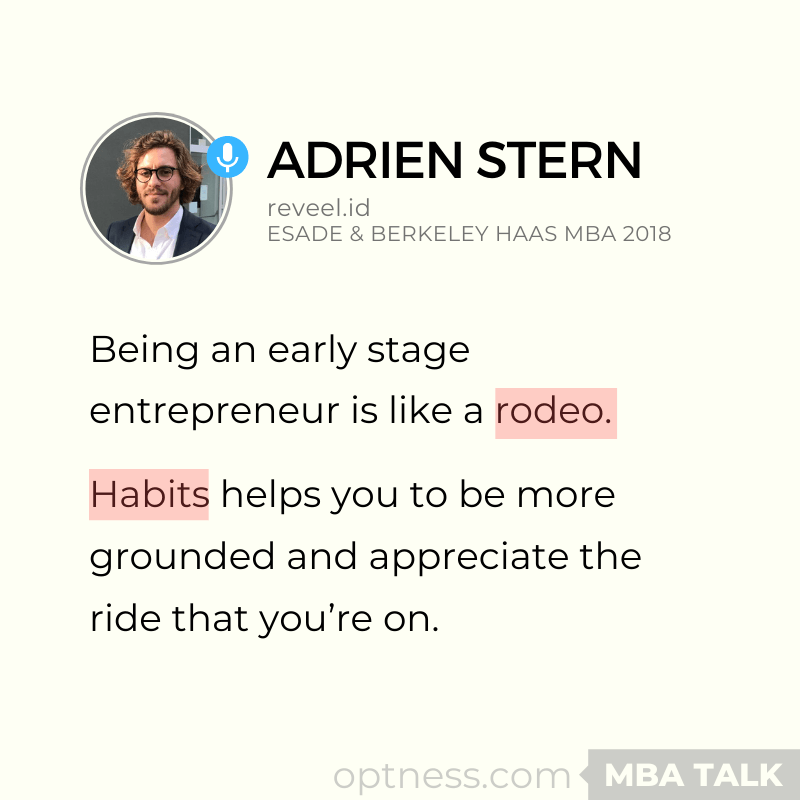
[02:08] I have a couple of ideas. I think one that may be surprising a good resource for entrepreneurs I would say is Headspace, the meditation app. And the reason why I say that It’s because being an early stage entrepreneur is like a rodeo. It can be really stressful. It’s a lot of highs and a lot of lows, and having some type of habit that helps you to be more grounded and appreciate the ride that you’re on is really important. So that’s why I say Headspace, I know it’s a little unconventional.
And don’t get me wrong, I listened to a lot of podcasts and audiobooks. Podcasts like StartUp from Gimlet or How I Built This from NPR are really great resources in order to hear the stories from other founders. I feel that’s always super beneficial because, in the end, you find yourself in similar situations and hopefully, you can get some learnings from other people’s experiences. So, those are definitely other resources that I’d love to tap into.
And today you are the owner of Mediarite, right?
[03:47] Yes, I am one of the cofounders and the CEO of Mediarite (now Reveel.id), a music tech venture, and we’re looking to rebuild a fair music industry. We want to use blockchain to help music right owners to be in direct relationship with the digital service providers, all the big streaming and download companies.
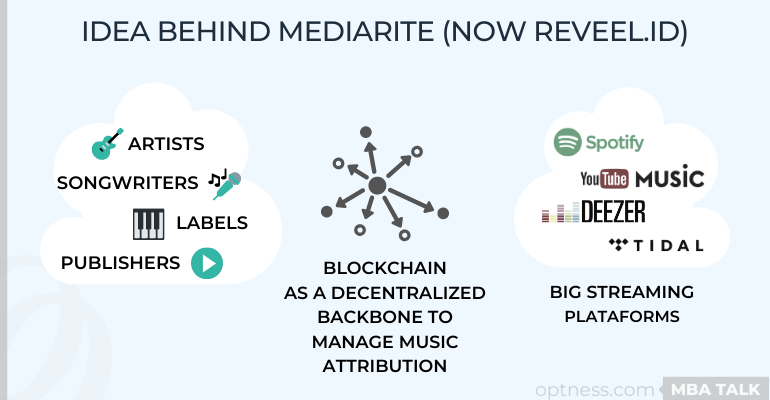
When did you decide to become an entrepreneur?
[04:34] Well it’s funny because when I was younger I didn’t necessarily consider myself an entrepreneur, and only later have I realized that was sort of always part of what I was trying to do.
When I was managing the band it was just like a normal task because I used to play in a reggae band based in Switzerland called Najavibes. I was the guitarist and It was like: “Okay, let’s see how far we can take this”.
I started managing the band and I’ve never thought of it as: “Oh! I’m being an entrepreneur and I’m starting a business”. I always thought of it as: ” This is what I love, so I’m just gonna try to push it further.’‘ So, I think I always had sort of that natural instinct to pursue the things that I’m passionate about, and try to build my life around them.
Adrien´s Experience in Bringing Digital Transformation in a Bank
When did you start to think about Business School?
[05:49] Well, there were a couple of steps in between that. When I was 25, I felt like I needed to reorient my professional life and try new things because I loved the music but it was such a hard industry to make a living off.
So, I decided to move to the US and I got a job in banking at BNP Paribas, the French bank. They needed someone to help them understand digital communications and I used that a lot for the band.
Basically, I started leading this digital transformation project at the bank to shift more of the communication and marketing to digital. I worked for almost three years at BNP Paribas, and I got a lot out of it in terms of understanding how big corporations work, their needs, the process and working cross-functionally, etcetera.
But I think I got into a point where I was ready for new challenges, and quite frankly I wasn’t quite sure what I wanted to do. I knew that I wanted it to be more towards innovation, entrepreneurship, and something that was maybe a faster pace than big traditional big corporates, who can be a bit slower sometimes. So, It was all this in there along with the fact that I always had the intention to pursue my studies. Those were the two main drivers for me to be like: “Now it’s time for me to do an MBA”.
Can you tell me a little bit about the work you were doing at BNP Paribas?
[07:56] Basically we were looking at how we can use digital communications, not only for PR (Public Relations) and brand awareness but also for marketing, to some of our spokespeople to be on social media platforms, for sales teams to be able to reach out to prospects and potential clients.
This was in a time where banks were not necessarily using social media from a sales perspective, especially, not in industries like investment banking, which is a highly regulated industry. So, there were a lot of processes, regulations that we had to make sure that we had to put in place and follow.
It was really a digital transformation project in the sense that it involves new software to be implemented, with new compliance policies to be put in place, and new HR policies to be put in place. And of course, I’m working with all the different business areas to see what digital strategy should be implemented for each one of them.
So, a very cross-functional position, which helped me really understand how a big organization like BNP Paribas is shaped, what are the actors in terms of pulling such a project together and understanding the dynamics for change management.
How big was your team?
[09:51] I was actually staffed in the Brand ON communication team. It’s a tough question because I was alone on the project. Working alone in terms of headcount but leading the transformation team, which was cross-functional.
I ́ve deal with senior executives from the different branches or functions represented, and with team members within them, with HR compliance and the different businesses. It was like a project management position, where you don’t necessarily have people that work under you, but you have so many people that you need to influence.
Managing an MBA Club Presidency & Two Internships
After this experience, you figure out that was the right time to do an MBA and went to ESADE in Barcelona?
[11:11] Yes, some of the motivations were to think: “How can I move to a faster pace environment?”; “How can I be exposed to different industries and different functions?” To actually be able to have a better idea of what I want to do, and how can I continue my studies because I always wanted to do a Master’s or something like that.
How did you manage to handle all of those activities?
[11:56] Well, one of the reasons why I wanted to do an MBA was to be able to try to get real experience and real insight into different industries, in different functions.
I immediately started the MBA in a very proactive way of what is interesting to me on how can I organize my MBA to make sure that I can experience as much as possible. So that I can, in the end, make a choice that feels like it is right.
I was really lucky because the MBA of ESADE offers a lot of flexibility that enables me to sort of taking a lot of electives and squeeze the first four terms into one year, which allowed me to then in six months to do two internships.
And then, I was able to do one internship in a sort of IoT startup and a second internship in consulting specifically around venture building and innovation. Those were amazing experiences.
What did you learn from these experiences?
[13:15] From the first internship at Bragi, where I was doing business development, I got that experience of what it is like to work in a scale-up. Cause I think there were already around 200 people when I got there trying to understand how fast a young company moves, and what are the responsibilities of a business development position in that type of company. So, that was extremely insightful.
And then the second internship was at Deloitte digital ventures and that was also fantastic. I got staffed on a FinTech project. Something that I was really interested in was the way that the team operates, it was really an entrepreneurial experience.
So, you’re working as an entrepreneur for an established company, it’s sort of building a spinoff if you will. And that was great because I got the early stage entrepreneurial experience. I also got a lot of exposure to really well-designed processes because it was under the umbrella of Deloitte consulting. It’s really a well-oiled machine, and just learning how to sort of efficiency in those processes was really valuable.
While in the internships you still had the idea of being an entrepreneur?
[15:18] No, I was definitely thinking about it. Actually, it was really interesting because when I started the MBA, I always hoped that I would find classmates, with whom we would have an idea and start a business. I was sort of always dreaming that would happen, and it didn’t happen.
When I was at the end of the MBA, I was like:” Should I look for jobs as well, just in case?”. I was kind of doing both, I was looking for jobs in fields that were interesting to me, like the things I did internships in, and I was as well, cultivating different potential venture ideas and trying to see if I could find the right partners to do it.
And, actually, it was during the last semester of the MBA, which I did here at Berkeley. Cause I did an exchange that everything sort of came together, I had a great entrepreneurship class here, and it really helped me sort of connect the dots in my past experiences.
Since I had been in the music industry, and I know how painful it was to track royalties and to get a good understanding of how your catalog is performing. And then, I ́ve had worked in banking, where people were starting to talk about blockchain, and how that whole industry was going to be impacted by that new technology.

And during the MBA in this entrepreneurship class with a professor, Kurt Beyer, he sort of taught us how to look at the trends and see how we fit in the trends, and where we can find opportunities.
While I was looking at my past music and blockchain, I was looking at how streaming is becoming a new way that people consume music, and that is actually finally bringing growth back into the music industry, which has been in decline for so long.
And so, all of a sudden, all these dots connected and I was like: “you know what.?this is a perfect opportunity for me!” I know the industry technology at a high level and it’s a good time to do this. I think we can actually really use technology to help artists be paid more fairly.
MBA Exchange Program at UC Berkeley Haas
This entrepreneurship course was at Berkeley during the exchange program of ESADE?
[18:22] Yeah, exactly, ESADE has a huge amount of partnerships with some of the best MBA programs in the world. So, their opportunities for exchanges are really all over the place, especially, here in the US with some amazing schools. I was fortunate enough to qualify and to get that exchange opportunity to come here at UC Berkeley, and that was a great experience.
Barcelona is a big hub in Europe for startups but is not comparable to the Bay area, right?
[19:02] Yes, of course. I think nothing in the world compares to Silicon Valley but I have to say Barcelona is quite a great place too. And in Europe, it’s definitely one of the strong entrepreneurship hubs. ESADE, it’s lucky to have a great entrepreneurship professor, who has really been driving both Masters and MBA programs towards a really strong in entrepreneurship focus.
And so, ESADE really does help people and students get that entrepreneurial spirit, then being in Barcelona is great because you get to collaborate or visit a lot of the companies who are starting there.
Tell us more about Haas@Work, which is the agency inside UC Berkeley
[20:05] Haas@Work is a really cool program. It’s actually an elective part of the program, where students can choose a project to work on or the partner companies can choose the students to participate. Basically, you can act as a consultant of a design consulting agent, and you work with real companies to solve real issues. I was lucky enough to be part of that and we worked with one of the major American banks and did an entire design project for them.
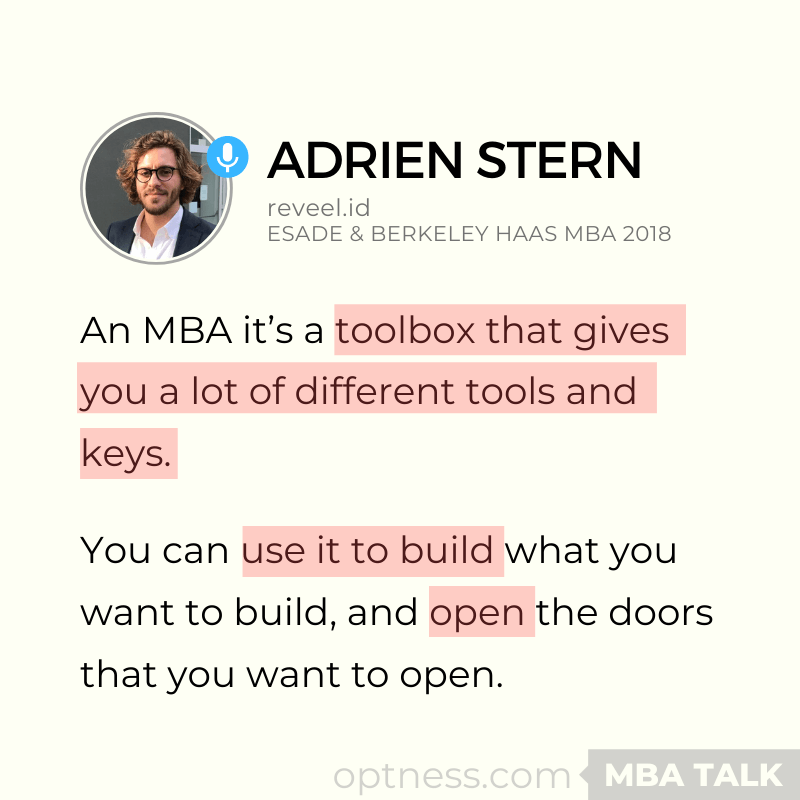
I really wanted to embrace the opportunities that the MBA gave me, and so I took a leadership position as the president of the Design and Innovation Club at ESADE and I signed up for a lot of case competitions. That allowed me to work on projects for Chinese companies, American companies, and Spanish companies, and to really work in a lot of different industries.
One of the beauties about doing an MBA program is that it’s a toolbox, they give you a lot of different tools and keys that you can use, and then it’s up to you to build what you want to build and go open the doors that you want to open. I tried to build as much and open as many doors as I could through those two years.
Acknowledging Our Limits & Potential
How did you handle all this because it’s a lot of work, right?
[22:09] Yes, of course, It’s a lot of work and when you enjoy what you’re doing work doesn’t seem like work. I really approached the MBA and approach my work with Mediarite (now Reveel.id) in the same way, where I just tried to have fun with the work that I’m doing. I try to appreciate the hard moments, and I try to appreciate the fun moments. If you’re able to keep that mentality, then, work doesn’t feel like work so much and you can do quite a lot.
But one of the learnings for me of the MBA was, actually, understanding what was my limit in terms of how much work I could take on. And what I discovered is that we can stretch ourselves pretty, pretty broadly when we’re passionate about what we’re doing. And so, I always try to get involved in stuff that is important to me, that I feel passionate about.
What are the limits you discovered by stretching yourself?
[23:23] When you learn how to build teams and how to work with different people during the MBA, it’s a very collaborative approach to work. So, you quickly learn what are your limitations on what is your expertise, what you’re not an expert at, and how to find people who can complement your skills.
Because if you don’t do that, you’re not going to be able to perform well. So, that was a great learning for me in terms of realizing that some people have a lot more knowledge than I do in specific areas and I need them. So, the question is: how do I surround myself with people who can help me?
Building Music Tech Venture Startup
You were in Berkeley at the end of your MBA when Mediarite started?
[24:25] I finished my MBA last summer and I had a job offer. On the other side, I had this idea for Mediarite (now Reveel.id) and I wasn’t really sure what I was going to do. So, I decided to give myself a couple of weeks to see if I could find the right partners to start the business. And so, that was the first step.
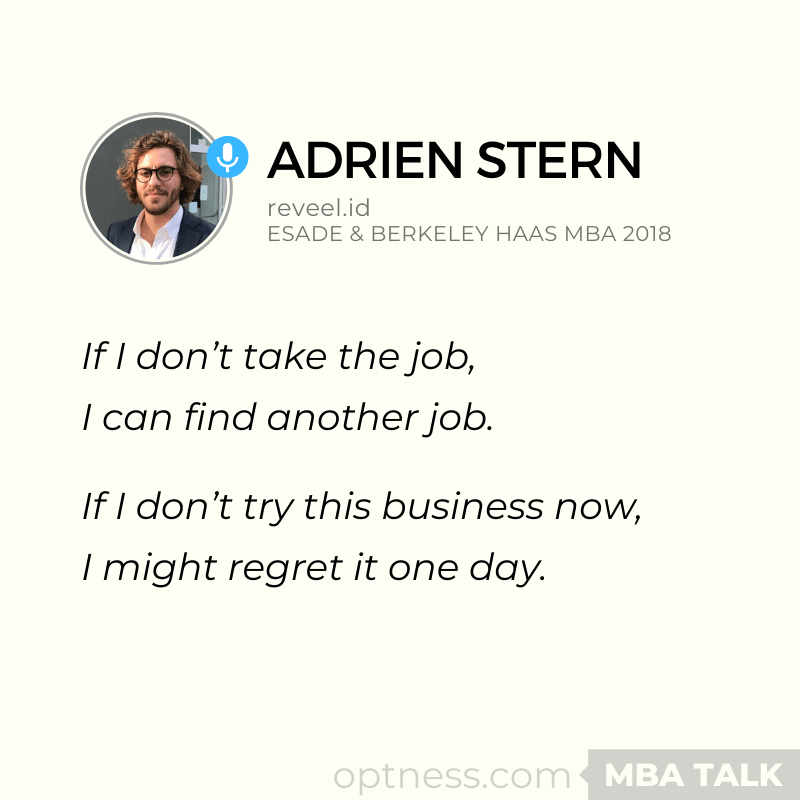
So, I started looking for people who were ready to be entrepreneurs, who had the right skills, who were passionate enough about the problem. And, luckily, I found two great co-founders, Walid, who is a full-stack developer, and Angelina, who is a blockchain engineer.
Then, I was in a situation where I had on one side a startup idea with the right team or a job offer that was good. And now I had a choice to make and I thought: “If I don’t try this business now, I might regret it one day. If I don’t take the job, I can find another job. But this idea has the right people. Now it’s the right time for it. So, I just need to go.“That was in September 2018.
How is the agreement between the other founders since they already have another job?
We found an arrangement with my co-founders where they’re still working part-time and I’m full-time. But it made sense because I guess it’s a bit more business heavy than it is development heavy in this early-stage. And so, you have to find the right fit and the right arrangements with your partners.
But I believe I didn’t want to go in with just one foot, I wanted to jump in fully and give it a real shot and give it a certain amount of time to try it out. And if it doesn’t work, then it doesn’t work and that’s life. I wanted to give it everything that I had.
What’s wrong with the music industry?
[27:09] That’s a great question, there are so many things that are wrong with the music industry, but one of the things that I find heartbreaking is that artists, on average, make 12 cents for every dollar that their music generates. So, the reason why is because the value chain of the music industry has so many intermediaries who all take a cut, and don’t get me wrong some of these intermediaries provide a lot of value.
Also, at one point, there used to be a time where every intermediary had it’s a real purpose, but now that we’re in a digital age, over 50% of music consumption and revenue from recorded music is coming from digital platforms streaming and download. So, there’s less need for these intermediaries, I would even say there’s no need for them.
What we’re looking to do is actually build technology that allows music right owners. So, that’s labels, publishers, artists, songwriters, are allowed to be in direct relationship with the big streaming platforms and download platforms. (click here to understand more about the topic)
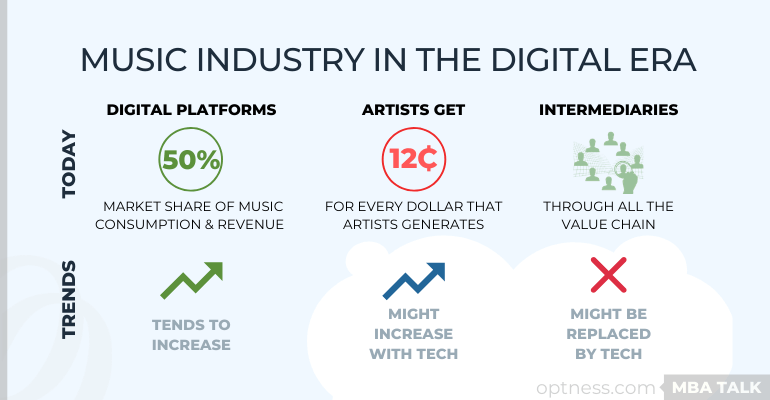
Applying Blockchain to Solve the Royalties Problem
And to solve this problem you are using blockchain as a technology?
[28:44] Exactly, we with this technology can replace what the current intermediaries are doing, encrypt the data and ensure a secure flow of information and on payments between the different parties on both ends of the value chain.
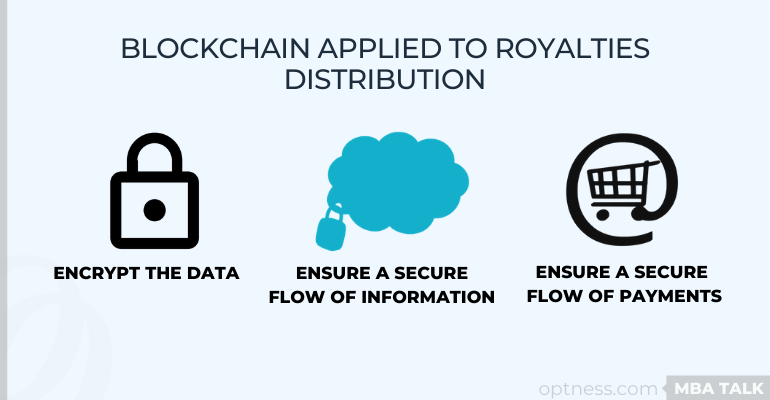
| Most people know what a blockchain is but for the most that don’t, at least, from my understanding blockchain is like a big accounting book where everyone writes down their balance and transactions. Therefore, when you checkbooks with one another you can resume. It’s kind of a big decentralized ledger. (Optness – Andrés) |
What are other types of transactions that can be used for?
[29:46] Well, you can use it for payments, but you can use it as a decentralized database. And then with smart contracts, you can automate the execution of different conditions.
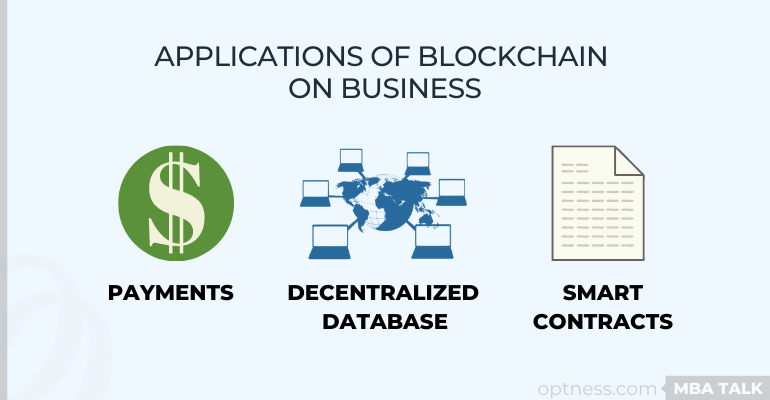
| So you came up with this idea of decentralizing and making more lean the chain of value from the listener to the musician. |
Did you go for investment funds? Bootstrapping?
[30:18] Yeah, we ́re in a super early stage. It’s been only a couple of months since we have the team together, and still, we got this started. We´re, actually, starting our fundraising now and we already have some good validation. We’ve been talking to a lot of record labels and already signed a couple of letters of intent. And we’re working on our MVP currently. So, yeah, we’re moving ahead on all fronts and hoping to raise our first round as soon.
Are you looking to grow your team soon or it’s still early for it?
[31:02] We’re growing the team in the sense that we’re bringing on some really great advisors. We are not looking to really grow the operational team yet, but that will definitely happen. I’d say in the next six to nine months.
Motivations for Entrepreneurs to Do an MBA
What’s your response to skeptics that say that business school is a waste of money for entrepreneurs?
[31:41] I mean, it’s a tough question. I think you should only do an MBA if you know why you’re doing it. Most of the people have three motivations for doing an MBA. The first is they want to change of industry, the second is to change function, and the third is to change geography.
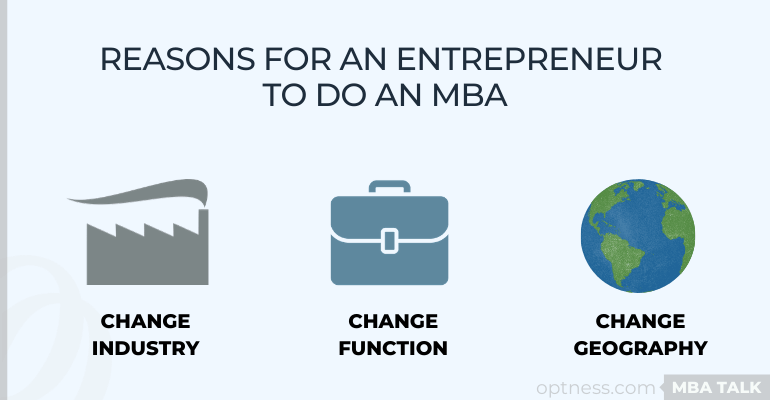
And of course, you can combine, since they’re not mutually exclusive, you can combine these changes. But if you’re not sure that you want to do either of those three, I’m not sure it’s valuable. For an entrepreneur, if you have the skills that you need to start a venture, an MBA is not necessary. However, if you don’t have a deep business background, an MBA is a wonderful way to acquire that. And the reason why I say that is it’s not a theoretical program.
It’s not like a Master’s, an MBA is very applied and very hands-on. Where most of the education is done via case studies. You put yourself in the skin of a CEO, of an entrepreneur, a chief marketing officer or whatever the cases. Also, you understand what the thinking is behind the decisions that are taken.
That’s extremely valuable for the day when you’re an entrepreneur and you need to make those decisions. And you have something to follow on because you’ve already sort of put yourself in those shoes before. I think it’s hard to say that every entrepreneur should do an MBA. I don’t think that’s the case, but I believe that there is a lot of value to be gained for entrepreneurs.
Would you have changed anything about your business school experience?
[33:50] No, honestly, no changes at all. I’m so happy going to ESADE, the choices that I made for internships and for exchange programs. I honestly have nothing to change.
—
In this interview, we share some of Adrien´s professional experiences, as an MBA candidate, and on his music tech venture project in early-stages as an entrepreneur.
Thank you for joining for this episode of the MBA talks, a podcast brought to you by Optness Institute. You can find all Notes of the other episode, as well as SUBSCRIBE for future episodes@optness.com/mbatalk. And if you’re enjoying the materials, have any comments, topics, or suggestions, I love you to shoot me an email. My name is Andrés and you can write to me at mbatalk@optness.com.
With that, thank you and we’ll see you in the next episode.
Check out our courses specifically designed for MBAs
Learn how to manage a backlog, workload, hand off activities to a team, differences managing company employees vs contractors and much more!
Coming Soon –> Connect if you want to know more!
Design thinking is all about creating unique solutions to complex problems — no matter how big or small.
Coming Soon –> Connect if you want to know more!
- 2-days long
- Instructor-led
- Management focused
- Methodology to attain goals and solve problems
- Use of real case studies
- Green Belt certification included
Live a day working with the Sprint methodology created at Google Ventures to solve big problems and test new ideas in just 5 days.
Coming Soon –> Connect if you want to know more!
